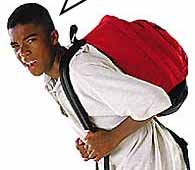

Survey Finds Back Packs Can Cause Student's Problems





Orthopaedics Update Press Conference
For more information, contact:
A.J. Wright (847)384-4034 wright@aaos.org Todd Schuetz (847)384-4032 schuetz@aaos.org Claudette Yasell (847)384-4035 yasell@aaos.org NEW YORK - Back to school should not signal the start of aches and pains, but for many youth who use back packs, it could be full of visits to the physician's office.
In a survey conducted by the American Academy of Orthopaedic Surgeons, 58 percent of the orthopaedists reported seeing patients complaining of back and shoulder pain caused by heavy back packs. "Overloaded back packs are contributing to these increased visits to the physician's office," reported Charlotte B. Alexander, MD, practicing orthopaedic surgeon, Houston Sports Medicine Associates, Houston, here today at the Academy's Orthopaedics Update. "The extra stress placed on the spine and shoulder from the heavy loads is causing some unnecessary medical problems in children."
More than 70 percent of the orthopaedists surveyed indicated that heavy back packs can become a clinical problem in school-age children if not enough attention is made to decrease some of the weight being carried in the packs, Dr. Alexander said.
The orthopaedists cited muscle fatigue and strain as the top clinical problems that could occur if children continued to load their back packs with books, athletic equipment and other school essentials.
"The survey findings do not suggest a link between back pack use and the development of a serious pediatric condition like scoliosis or spondylolysis," Dr. Alexander said. "Instead, we want these results to be used to educate children on how to use back packs properly in order to decrease stress on their back and shoulder muscles." The survey, which included responses from more than 100 physicians at Children's Memorial Hospital, Chicago, Ill. and Alfred I. duPont Hospital for Children, Wilmington, Del., also concluded that a back pack could cause injury to a child when its contents weigh 20 percent more than their body weight.
"If you have an 90-pound female carrying a 20-pound back pack, then the back pack weight becomes a medical issue," Dr. Alexander said. "It is at this level when students could experience some sort of muscle fatigue or injury to their bodies especially the spine and shoulders."
Fifty percent of the physicians surveyed also indicated they felt a back pack becomes a clinical problem by 20 pounds. "Most of the students surveyed are carrying back packs weighing more than 10 percent of their body weight," Dr. Alexander said. "We found one 10-year old female student with a back pack weighing 47 pounds."
Overloaded back packs used by children have received a lot of attention in schools. Everyone from parents to school administration staffs have started to voice concern about their use. "As specialists who treat the musculoskeletal system, orthopaedists are concerned about this potential 'hazard' to a child's body," said Dr. Alexander. "Orthopaedic surgeons are starting to notice an increase in children visiting their offices with muscle fatigue problems that we usually did not see until later in their adult years."
Dr. Alexander noted the survey indicated that excessive weight carried in back packs can cause some children to develop bad habits early in life like poor posture or excessive slouching. Students carrying more books, extra bags and less time between classes to visit their lockers were noted by the orthopaedists in the survey as reasons why childrens' back packs are heavier than years ago.
Asking students to modify the way they currently use their back packs is one way to combat the problem, Dr. Alexander said.
Orthopaedic surgeons involved in the survey recommended that children and their parents adopt these guidelines when using back packs:
In 1998, the Consumer Product Safety Commission tracked visits to physician offices, clinics and hospital emergency rooms related to back packs. Children, five to 14 years old, had 10,062 visits, and teens, 15 to 18 years old, had 2,719 visits.
- A back pack's weight should not exceed 20 percent of your body weight, and even less for a young child.
- Use a hip strap for heavier weights.
- Use a back pack with padded, wide straps and a padded back.
- Use both of the back pack's straps, firmly tightened, to hold the pack two inches above your waist.
- Engage in exercises to condition your back muscles. Ask an orthopaedic surgeon for advice.
- Use the correct lifting techniques. Remember, bend with both knees when picking up a heavy back pack.
- Place the heaviest items close to your back.
- Neatly pack your back pack, and try to keep items in place.
- Try to make frequent trips to your locker, between classes, to replace books.
- Consider purchasing a back pack with wheels.
- Purchase a second set of books for home.
An orthopaedic surgeon is a medical doctor with extensive training in the diagnosis and nonsurgical as well as surgical treatment of the musculoskeletal system including bones, joints, ligaments, tendons, muscles and nerves.
The 23,800-member American Academy of Orthopaedic Surgeons is a not-for-profit organization that provides education programs for orthopaedic surgeons, allied health professionals and the public, and is an advocate for improved patient care.
Last modified 17/July/2000 by IS

Return to BACKPACKS


| Home Page | Visit Our Sponsors | Become a Sponsor |
Please read our DISCLAIMER |
